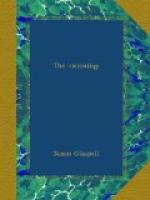He was both outraged and drawn. He neither rebuked nor agreed. He waited.
“You see it was this way. You were one thing; she was another thing. And neither of you had any way of getting at the thing that the other was. So you just grew more intolerant in the things you were, and that, I suppose, is the way hearts are broken and lives are spoiled.”
Her eyes had filled. It had drawn her back to her mood of the morning. “Doesn’t it seem to you,” she asked gently of the Reverend Saunders, “that it’s just an awful pity?”
The Reverend Saunders did not reply. But he was not looking at Katie’s quill or Katie’s shoes. He was looking at Katie’s wet eyes.
And Katie, as they sat there for a moment in silence, was not seeing him alone as the Reverend Saunders. She was seeing him as product of something which had begun way back across the centuries, seeing far back of the Reverend Saunders that spirit of intolerance which had shaped him—wrung him dry—spirit which in the very beginning had lost the meaning of those words which hung above the Reverend Saunders’ head.
It seemed a childish thing to be blaming the Reverend Saunders for the things the centuries had made him.
Indeed, she no longer felt like “blaming” any one. Sorrow which comes through seeing leaves small room for blame.
Katie did not know as much about the history of mankind as she now wished she did—as she meant to know!—but there did open to her a glimpse of the havoc wrought by the forerunners of the Reverend Saunders—of all the children of love blighted in the name of a God of love.
She had risen. And as she looked at him again she was sorry for him. Sterility of the heart seemed a thing for pity rather than scorn. “I’m sorry for you,” she spoke it. “Oh I’m sorry for us all! We all bungle it! We’re all in the grip of dead things, aren’t we? Do you suppose it will ever be any different?”
And still he looked, not at the quill or the shoes, but the eyes, eyes which seemed sorrowing with all the love sorrows of the centuries. “Young woman,” he said uncertainly, “you puzzle me.”
“I puzzle myself,” said Katie, and wiped her eyes and laughed a little, thinking of the scornful exit she had meant to make after telling him what she thought of him.
She retraced her steps and waited for two hours at the station, reconstructing for herself Ann’s girlhood in Centralia and thinking larger thoughts of the things which spoiled girlhoods, the pity of it all. And it seemed that even self-righteousness was not wholly to blame. Katie felt a little lonely in losing her scorn of “goodness.” She had so enjoyed hating the godly. If even they were to be gently grouped with the wicked as more to be pitied than hated, then whom would one hate?
Did knowing—seeing—spoil hating? And was all hating to go when all men saw?
At the last minute she had a fight with herself to keep from going back and refunding the missionary money! The missionary money worried Katie. She wanted it paid back. But she saw that it was not her paying it back would satisfy her. She even felt that she had no right to pay it back.




